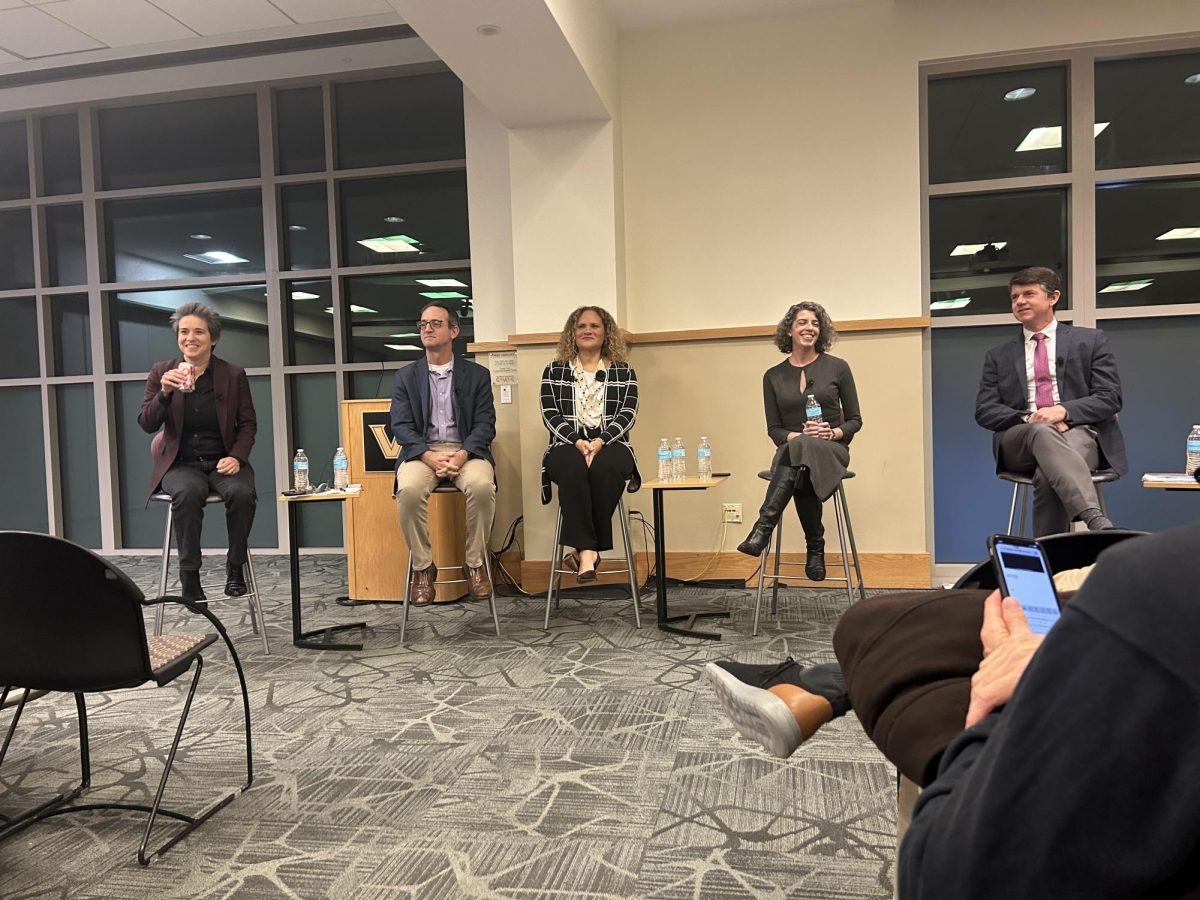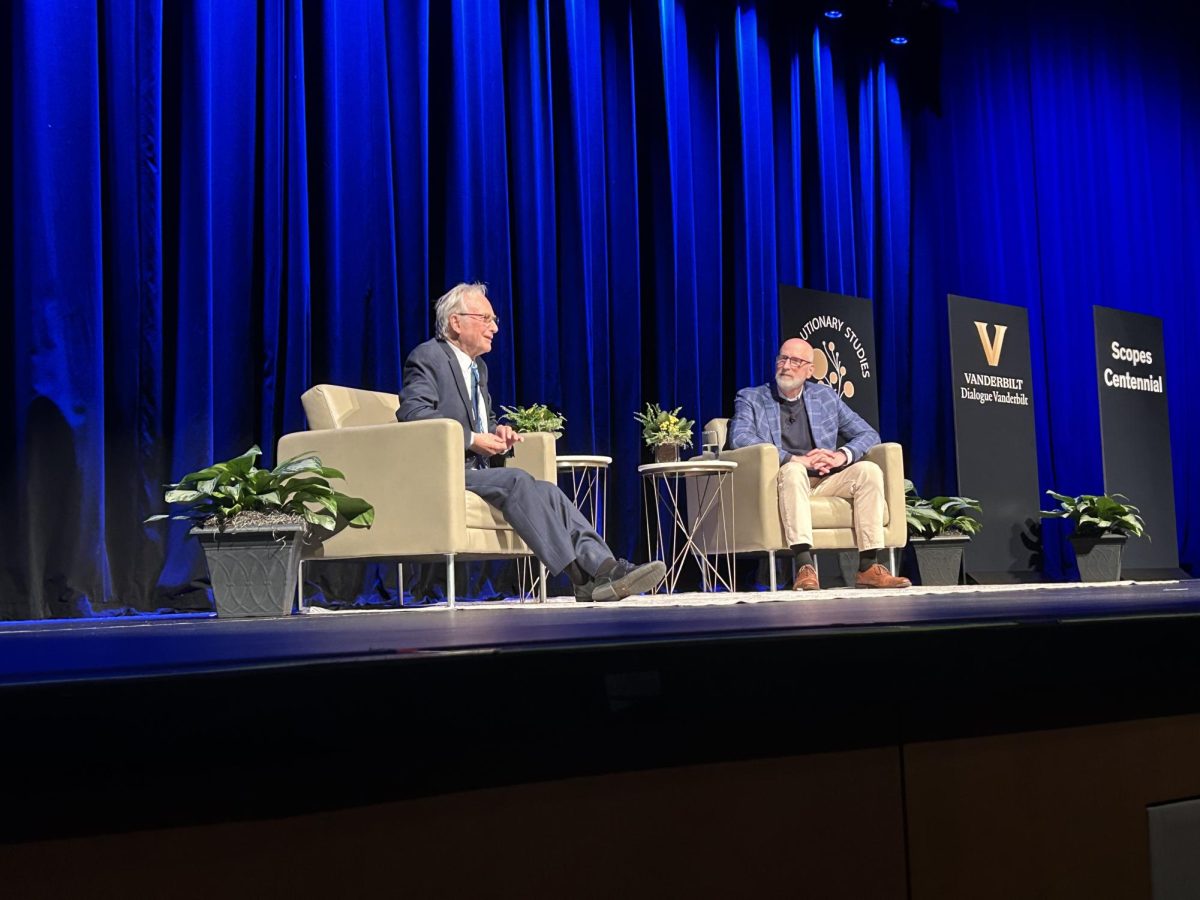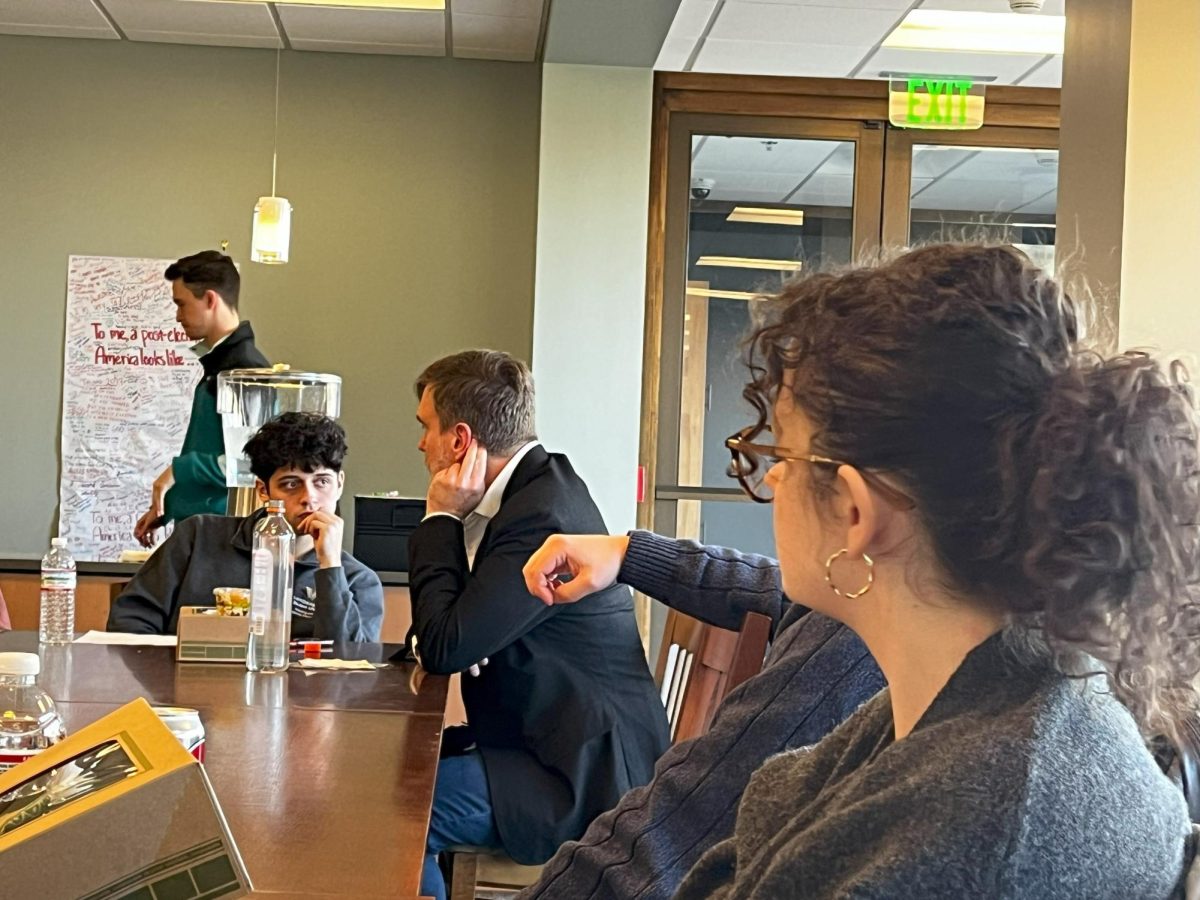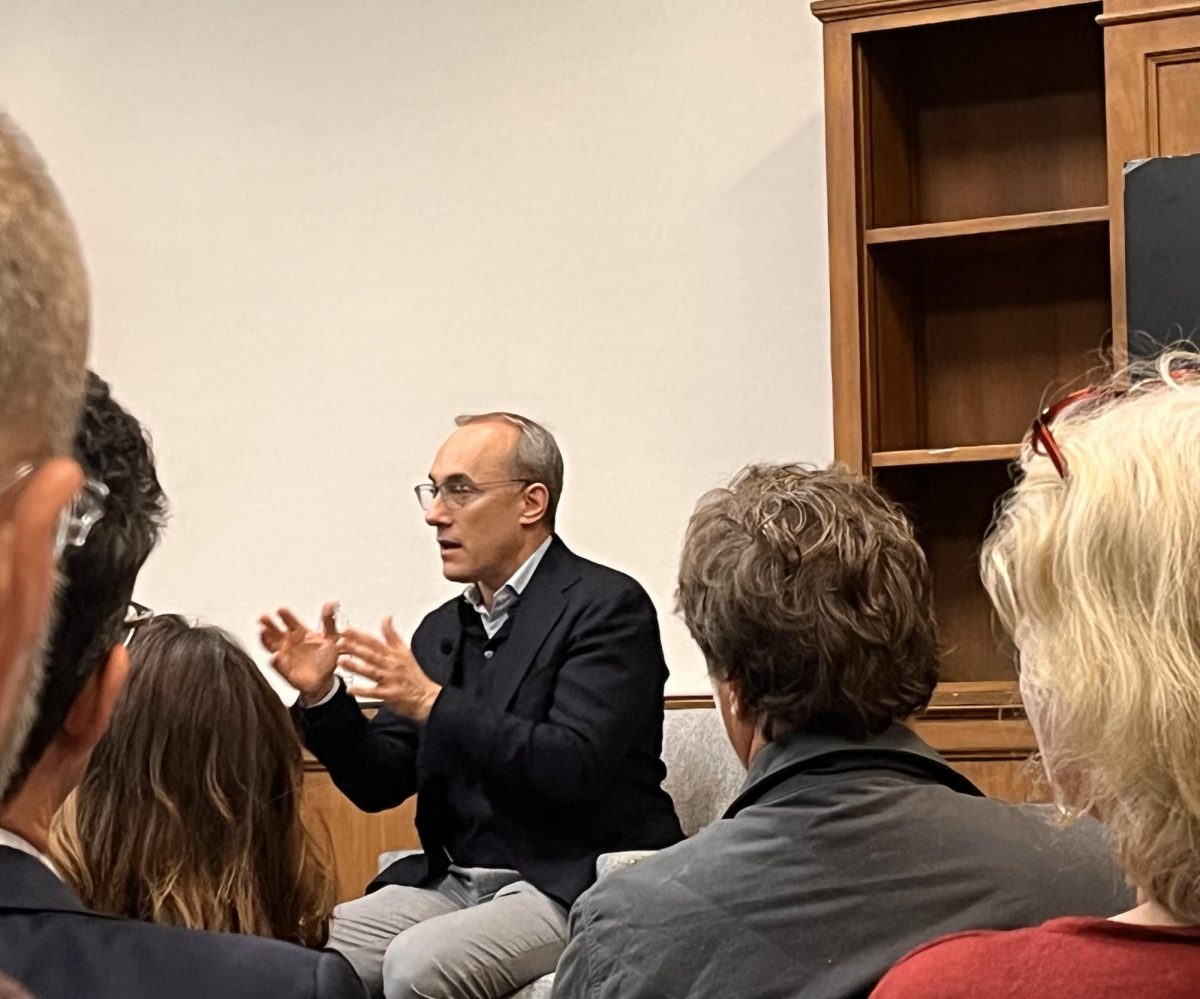Dialogue Vanderbilt and the Center for the Study of Democratic Institutions hosted a panel discussion examining President-elect Donald Trump’s 2024 election victory over Vice President Kamala Harris. Panelists discussed where the Democratic Party went wrong in terms of their messaging, how Trump solidified his hold over the Republican Party, and the broader political and social dynamics that shaped the election.
The event featured a political scientists and journalists from across the country, including Molly Ball, senior political correspondent for the Wall Street Journal; Seth Masket, political science professor at the University of Denver; Tasha Philpot, government professor at the University of Texas, Austin; and Amy Walter, publisher and editor-in-chief of the Cook Political Report. The discussion was moderated by John Sides, chair of the Vanderbilt political science department.
Analyzing the factors behind the results
Walter started by addressing the fundamental factors that she said she believes are at play in all elections: the president’s popularity and the public’s satisfaction with the state of the economy and the country. She asserted that while election results were a complex matter that bore further analysis, the core reasons people voted for Trump were the same as in any other election.
Sides then moved the discussion to focus on Harris’s race and sex, prompting Philpot to claim that Harris’ loss came down to the fact that she is a Black woman. She emphasized the consistency of this trend, noting that there was greater turnout amongst Black male voters in favor of Raphael Warnock than Stacey Abrams in the Georgia senatorial race in 2022. Philpot used this as evidence to justify her theory that Black male voters prefer male politicians over their female counterparts.
“This election saw a fear of emasculation and the idea that [Black male voters] are just not ready for a Black woman to be in a societal position higher than they are. In this sense, Harris being a Black woman was the main challenge,” Philpot said.
Masket then discussed voters’ opinions and overall feelings about the state of the country. He highlighted that every election since 2016 has been a change election, where the ruling party is switched out for another. Masket said he believed this instability directly correlated with Americans’ feelings on the country’s performance.
“We’re in this kind of grumpy era, and I don’t know what changes that,” Masket said. “People are also telling us they’re not thrilled with the way things are, and ruling parties don’t get a whole lot of time to prove themselves. There’s a lot of research on this in political science where people are judging the incumbent party by economic trends.”
Trump’s role in shaping the Republican Party
Ball offered her insights on the election results from a journalistic perspective, addressing the Republicans’ reactions to the win and thoughts on the future.
“Trump clearly had a galvanizing effect on the electorate that didn’t trickle all the way down the ticket,” Ball said. “A lot of Republicans are grateful to be there on Trump’s coattails.”
Ball also discussed how Trump appealed to traditional Republicans by adopting moderate stances on issues such as abortion, healthcare and social security. She went on to explain how Trump’s authoritarian ideals strengthened voters’ faith in his ability to break through the congressional gridlock and effectuate unilateral change. Ball explained that voters believed Trump’s policies, such as mass deportations and imposing tariffs, would be passed across the board.
Masket then touched on Trump’s influence on Republican politicians’ performances in their election campaigns. Trump has significantly swayed elections in favor of the candidates he endorsed. Trump’s power over the electorate led Masket to say he believes the Republican Party is, for now, the party of Trump. Masket justified this claim using a recent study he and his colleagues conducted.
“When [Trump] endorsed a candidate, that person tended to do about 14 or 15 points better than someone who didn’t get the endorsement,” Masket said. “That’s a huge impact for one person to have.”
The Democratic Party’s missteps
The discussion moved into how the panelists believed that Democratic Party’s messaging negatively impacted the election. The panelists then delved into why the election produced unexpected results by discussing the economy, immigration and identity politics. Ball claimed that the Democratic Party focused too much on Trump’s negative attacks toward racial groups rather than the material issues the working class was concerned with.
“Democrats have sort of misread their appeal to working-class voters of color, focusing on racism, nasty words and microaggressions,” Ball said. “In reality, the working class cares less about being insulted and more about their material circumstances and their prosperity.”
Philpot disagreed with this theory. He explained why these demographic groups haven’t been responding to some of the stronger rhetoric and racial slurs seen from the Trump administration, mentioning that Latino, African American and Asian American voters all have a different view on race.
“Race doesn’t operate for every group the same way it does for, say, Blacks,” Philpot said. “So what’s really operating is the distancing away from being a minority and adopting an ideology that seems to go with the mainstream, with the hope that you will be exempt from some of the policies that are coming down the way.”
Further discussions touched on the turnout of Latino and Black voters and their support for Trump. Compared to previous elections, Trump improved in this demographic of voters.
“Republicans picked up almost 40 points among Latinos from 2012 to now,” Walter noted. “Additionally, Trump got 20% of the Black male vote, [whereas] Republican candidates usually get 15%.”
Phlipot responded by addressing a main point about modern day political rhetoric.
“Do you remember Bush ever saying, ‘I’m going to deport everybody’? There’s this rhetoric that’s happening right now, putting people on alert,” Philpot said.
Future of the Democratic Party
The discussion concluded with the question of how the Democratic Party should learn from this election and what it should do differently going forward.
Walter argued that Democrats need to start by changing their overall messaging.
“[The] Democratic message has been one of anti-Trump, and that is a message that succeeded in 2018 and in 2020 and in 2022, but it kind of wore itself out by the time you hit 2024,” Walter said.
Philpot said Democrats need to “get it together.”
“Republicans, no matter how wrong they might be, know how to close the race and stay together. Democrats are like herding cats; [they’re] divided,” Philpot said.
Ball disagreed with this approach, saying she believes that Democrats need to fight to be more aligned with centrists instead of only appealing to the far left.
Student and professor reactions
Sophomore Brodie Labott said that despite the panelists being experts, they admitted that Trump is an “anomaly to political science.”
“[The panelists said] that even though there is preliminary data showing a lot of people shifting to the right, we shouldn’t expect that to continue or to be a lasting trend because it seems to fly in the face of everything they’ve studied,” Labott said.
Joshua Kayiwa (B.A. ‘22) said he noticed a lack of explanation for why people voted for Trump.
“[The discussion] focused on why Trump was elected in terms of what the Democratic Party didn’t do. No one at all touched on why people were attracted to Trump, except that he looked masculine, so black men voted for him,” Kayiwa said. “[The discussion centered around] more negative factors but not why anyone wanted to vote for him in any positive way.”
Associate chair of the political science department, Jonathan Hiskey, shared his main takeaways from the event in an email to The Hustler.
“It was a good evidence-based discussion of both the general patterns and more nuanced dynamics of the recent presidential election,” Hiskey said. “I was happy to see such a big turnout of students to this event on the day after Thanksgiving break as it is a testament to the desire of our students to take advantage of the education opportunities available to them within and outside the classroom.”











